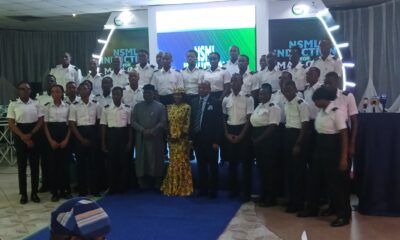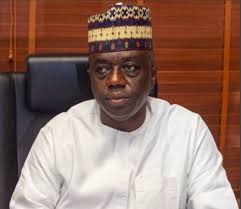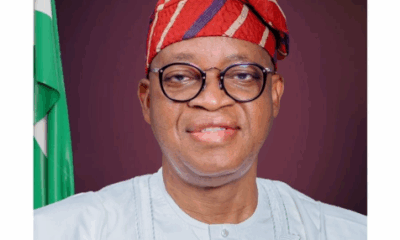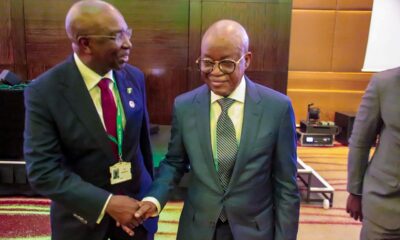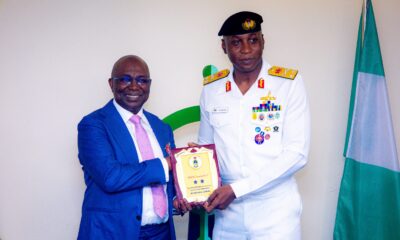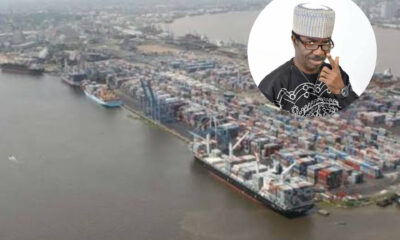Business Maritime
Maritime Industry At 64: Oyetola Versus Oyetola
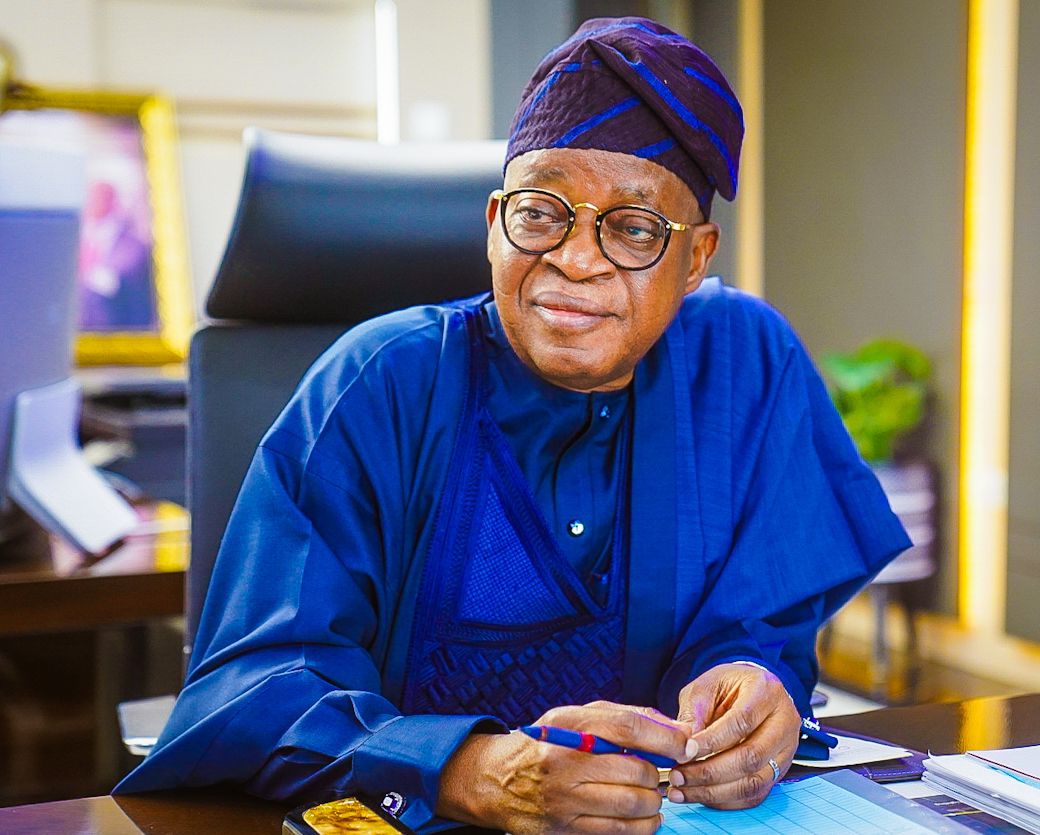
BY EGUONO ODJEGBA
“To thyself be true”- Williams Shakespeare
His Excellency, the Minister of Marine and Blue Economy, Adegboyega Oyetola, CON was 70 years old few days back; September 29, to be precise.
As a politician, it didn’t come as a surprise that he was celebrated in the media by friends, associates, admirers and subordinates, each camp wishing him well and also volunteering some goodwill messages speeches which were in the main, praises and accolades.
In Nigeria, while it is a norm to have only good words for serving politicians or sitting public office holders; beneficiaries, sycophants and bootlickers have a way of maintaining a safe upload of felicitations and accompanying rhapsodies; even as some are adept at achieving certain overdose.
So it was with the special tribute given by the Executive Director, Marine & Operations, Nigerian Ports Authority, Engr. Olalekan Badmus, who crowned the minister not only as a political colossus and pathfinder, but also as a maritime icon.
With a professional background in insurance and later a high heel local political player with the climax as occupant of Government House Oshogbo, many including this writer was taken aback by the inclusion of uncommon maritime wherewithal in the minister’s credentials.
While Engr. Badmus may have made his declaration with full conviction, knowing that ours is a permissive society receptive to all and anything, Oyetola’s new status must probably now be contesting for space with a prior similar declaration, reportedly by a former Managing Director of the National Inland Waterways Authority, Hajiya Maryam Ciroma, who was believed to have said during her first 100 days in office, that she was going to leave office as a proficient mariner.
As at the time she threw in the towel in 2014 following her resignation, it is not clear if she was already registered with the mariner’s professional body.
It is not also clear if our amiable minister of marine and blue economy is already living in the consciousnesses of that providential recognition with the swagger of a maritime icon. Whatever his reaction to the award, the words of Williams Shakespeare “To thyself be true” will no doubt continue to keep him company; be it in the public or in the quiet recess of his privacy.
Suffice it to say that his birthday anniversary which was few days before Nigeria’s independence anniversary quite fortuitously, threw up a lot of issues regarding the state of the maritime industry; and regarding questions of leadership failure or shall we say, leadership style, which stakeholders claim lacks the traction to produce the expected results, 64 years after.
While it will be unfair to hold the administration under which Oyetola serve as being wholly responsible for the shambolic state of affairs and the deteriorating national economy, we must also remind ourselves that during the campaign in 2023, President Ahmed Tinubu , Oyetola ‘s boss said his chief reason for wanting to takeover leadership is the desire to repair and reposition the political economy.
While Olalekan Badmus says that the maritime industry which is the second most critical sector of the economy is performing spectacularly under Oyetola, operators, players and observers have lamented that the opposite is the case; and wants the minister to reevaluate his leadership style in order to begin the serious business of jumpstarting the actual recovery of the industry they believe has failed to achieve anything worth celebrating as Nigeria marks 64.
Interpreted correctly, stakeholders say that the challenge to match talk with action that will also produce results, expected to stabilize the economy, is a one that Oyetola and Oyetola alone, must undertake. The lamentation rests squarely on worries that the minister as the lead striker is taking some rather ponderous steps seen as a disincentive.
There is also concern that unless the minister, his directors and the leadership of the agencies under him walks at the same pace, chances are that gaps that may be created could also impact negatively on efficiency and productivity. That brings us to yet another concern that the minister may have been performing below speed, given the evident slow pace of work and progress.
It will be recalled that while issues about his real age in lieu of his performance recently received media attention, there has been supposition that whereas age may have been weighing on him given the weight of his assignment, ill health has also been suspected, especially owing to issues about his where about in the past couple of weeks.
While wishing him well with mental alertness and physical agility to withstand the demand of his official workload, some well wishers have expressed displeasure at the slow rate of the industry growth response, to his supervision and direction.
It is instructive that while Oyetola is the pioneer minister to superintend the affairs of the newly created marine and blue economy, the promise and expectation was that he had the wherewithal to deliver on the needs of the industry with its slightly newer outlook, than hitherto.
Sadly, in assessing the industry’s performance especially in the light of the nation’s attainment of 64 years of nationhood yesterday, 1st October 2024, stakeholders were sharply divided on the gains the government has recorded, particularly since the minister’s appointment.
According to Dr. Eugene Nweke, a resource person and Head, Sea Empowerment and Research Centre, port operations efficiency has not shown any significant improvement since the inception of his appointment.
Nweke argued that if the industry continues at this pace, Nigeria may loss more volume of her cargo traffic to sister neigbouring countries, which he says has greatly outperformed Nigeria through better policy initiatives and better service delivery with more friendly trade costs than Nigeria.
The former President of the National Government Approved Freight Forwarders (NAGAFF) called on Oyetola to undertake an independent audit of the system to help him determine actions to urgently improve the efficiency and competitiveness of the nation’s port trade.
In a presentation he tagged “64th Independence Anniversary: A retrospect of the Maritime Industry – Matters Arising” Nweke challenged the minister and his CEOs to halt the tide of system defaults that has so far created compromises, by quickly instituting measures to bridge vaulting capacity development gaps; noting that appropriate and competitive policy ideas can stimulate appropriate economic alignments and restructuring that will give fillip to the nation’s GDP and launch the marine and blue economy beyond the present frontiers.
“Nigeria’s ports are often categorized as one of the most unfriendly ports in the continent and the world due to various challenges and inefficiencies. Some ports still observe manual and cumbersome procedures, leading to delays and errors. There is also the factor of high costs, excessive charges, fees and levies which leads to bureaucratic hurdles, promoted by complex and time-consuming regulatory requirements”, adding:
“We have issues of poor system management, ineffective leadership and management structures. These challenges lead to increased costs, reduced competitiveness, which decreases investors’ confidence, ultimately affecting Nigeria’s economy and trade.”
He said until and unless Nigeria recognizes the existence of intense competition in the sub region and adjusts its trading pattern, the dream of achieving target growth campaign tied to the marine and blue economy will be a mirage.

“On the exorbitant port trade costs, estimates suggest that the total costs of cargo clearance from ports in Nigeria are significantly higher compared to other West African ports. These costs can make Nigerian ports less competitive and may discourage investors and shippers from using them.
“These higher charges can make Nigerian ports less attractive to shipping lines and cargo owners, potentially diverting trade to neighboring ports”, he said.
Nweke challenged the minister to cause for an urgent review of the fiscal instruments and the prevailing, asphyxiating tax regime as a way to renegotiating a safe passage to a competitive port trade and the regime of related, overpriced ports and cargo administration.
“We are familiar with the allegations of un-receipted fees, charges and settlement around the operational activities of both NIMASA, NPA, NAFDAC SON, etc. It has been argued that the agencies under declare their real annual revenue generation to the government, as compromises is said to have continued to thrive.
“The essence of this operational retrospect is to draw the attention of the Minister and the Ministry of Marine And Blue Economy on the reality of our port industry and the need to look inwards, to take deliberate steps to correct the wrong image on the internet, that Nigerian Ports are business unfriendly and expensive.
“I urged the Minister to take adequate measure to strike a balance between cost function charges on cargo and illogical charges which constitutes an exploitation of the shipping lines, who in turn escalate such charges to Nigerian shippers, thus, thus leading hyper inflation.”
“The Ministry should pursue a deliberate action to engender competitiveness of our ports, review the present international shipping laws with a view to reform and our handling charges.”
Also, Dr. Bolaji Akinola , a budding maritime analyst, consultant and media personality, in particular, lamented the collapse of the nation’s indigenous shipping sector, noting that there appear to be no genuine plans in place to fix the default.
In a brief treatise, Akinola went memory lane to the period where leadership focus was a culture, until things begun to fall apart; with plea that this government should take bold and convincing steps to work a turn-around in the fortune of the country and her citizens.
Akinola lamented that as a result of capacity gap, foreigners have taken full control the marine economy.
“As Nigeria marks 64 years of independence, one of the most glaring failures of our post-colonial governance is the tragic collapse of our indigenous shipping industry. The Nigerian National Shipping Line (NNSL), bequeathed to us by the colonial administration as a robust national shipping carrier, once stood as a symbol of pride, sovereignty, and economic promise.
“At the time of independence in 1960, Nigeria inherited a fleet of ships that were not only operational but positioned to support our emerging economy. The NNSL was a testament to the vision of building a self-sufficient maritime power capable of transporting goods and commodities both in and out of our bustling seaports. “But today, 64 years later, we find ourselves in a pitiful state, where no Nigerian shipping company owns even a single vessel among the over 5,000 ships that call at our ports annually.
“These ships, owned by foreign interests, dominate our waters, enriching their nations while we sit idly by, exporting oil, gas, and agricultural produce, and importing manufactured goods without a stake in the process.”
He argued that all factors required to return to the good old days depends on riding the respective critical organs of government of corrupt, incompetent and polluted leadership.
“This collapse is not due to a lack of potential or resources, but rather a systematic and pervasive failure of leadership and vision. The Nigerian Maritime Administration and Safety Agency (NIMASA), created with the primary mandate of promoting indigenous shipping, has failed spectacularly in this regard.
“Established to regulate and nurture the growth of local shipping companies, NIMASA has instead become a bureaucratic entity more interested in revenue collection than in fostering the growth of indigenous maritime capacity. The sad reality is that despite NIMASA’s vast resources and regulatory power, Nigeria’s presence in the global shipping industry remains negligible.”
Still bemoaning the fate of local shipping, he accused the political leadership of betraying the country and its people.
“Worse still, the Federal Government’s approach to the development of indigenous shipping has been nothing short of lackadaisical. Successive administrations have paid lip service to the need for a vibrant national shipping industry, but their actions have demonstrated a complete disregard for the sector’s strategic importance.
“The national shipping line was allowed to decay, with successive governments failing to invest in its revival or even establish policies that could encourage the growth of indigenous companies capable of competing in the international shipping arena.”
An unrepentant advocate for change, Akinola says he believe that whereas, with the right mindset, this administration can lead the needed rebuilding, he says operators of the system has however chosen propaganda as a weapon of defence.
“The creation of the Ministry of Marine and Blue Economy by the present administration was seen by many as a step in the right direction. Yet, almost a year after its formation, there has been little to no improvement in the state of indigenous shipping.
“The ministry has yet to make any significant strides toward addressing the core issues plaguing the sector, including lack of infrastructure, access to capital, and policy support. The Nigerian government seems content to allow foreign-owned vessels to dominate our waters, extracting profit from our resources while we remain passive spectators.
“The negative impact of this failure is far-reaching. Without a strong national shipping carrier, Nigeria is at the mercy of foreign shipping companies, paying exorbitant rates for the transportation of our goods. This erodes our trade balance, weakens our economic independence, and limits job creation in a sector that could employ tens of thousands of Nigerians. Moreover, the absence of a robust maritime industry stifles our ability to leverage the blue economy, a sector that could potentially contribute billions to our GDP if properly harnessed.”
He recommended among other things, the right stewardship passion and commitment as panacea for pulling Nigeria out of the wood.
“The government must get serious about developing indigenous shipping. This requires more than the creation of ministries and agencies; it demands a focused, strategic plan that includes investment in shipbuilding infrastructure, access to credit for Nigerian ship owners, and policy frameworks that promote local participation in international trade.
“NIMASA must be refocused to fulfill its original mandate, not as a revenue-generating agency but as a true promoter of Nigerian shipping interests. We must also recognize the strategic importance of having our own national shipping carriers. It is inconceivable that a country with the economic potential of Nigeria remains without its own fleet of vessels. Participation in the movement of international trade is not just about economic gain—it is about sovereignty, security, and our standing in the global maritime community.”

